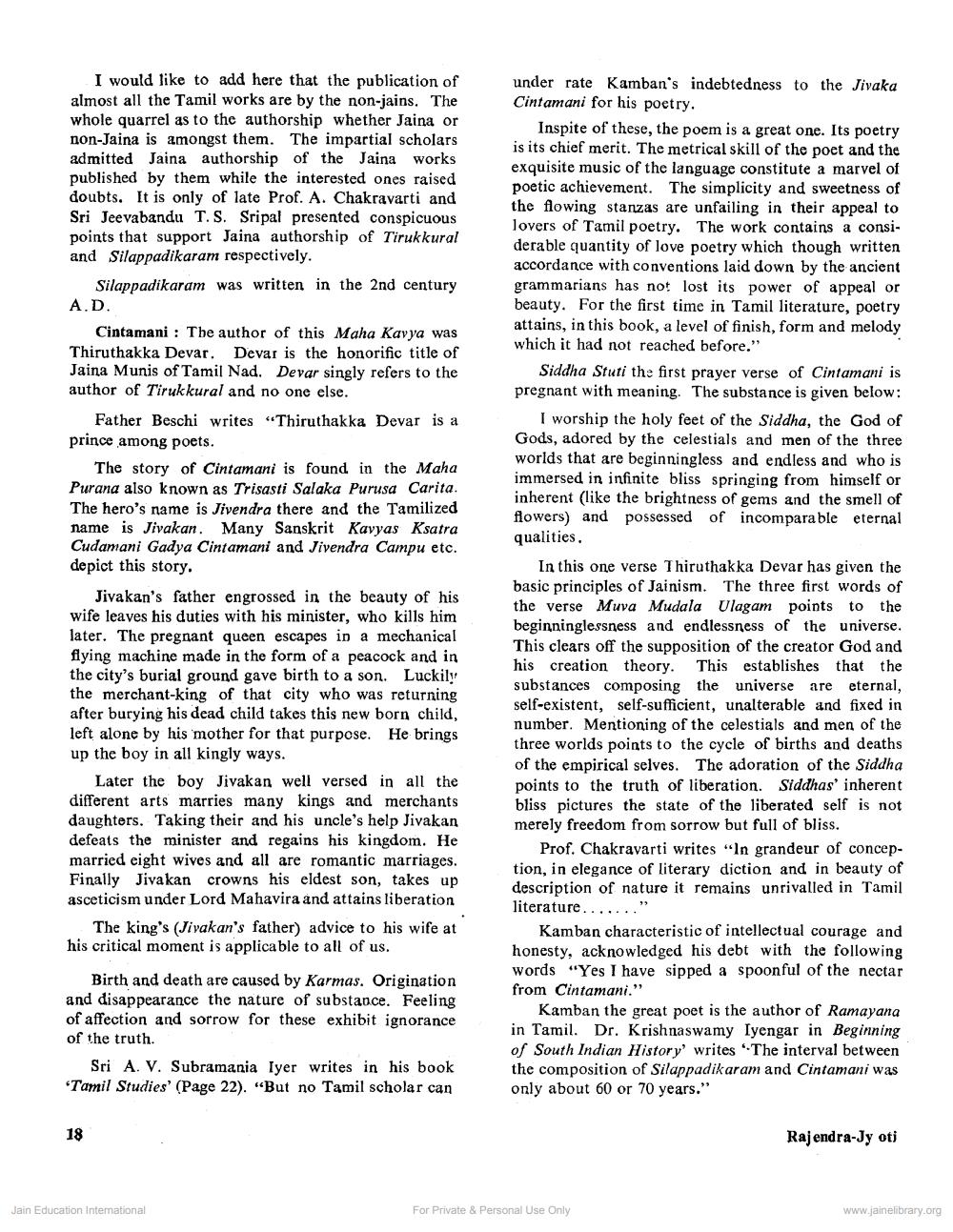Book Title: Jainism in Tamilnadu Author(s): S Gajpathi Publisher: Z_Rajendrasuri_Janma_Sardh_Shatabdi_Granth_012039.pdf View full book textPage 7
________________ I would like to add here that the publication of almost all the Tamil works are by the non-jains. The whole quarrel as to the authorship whether Jaina or non-Jaina is amongst them. The impartial scholars admitted Jaina authorship of the Jaina works published by them while the interested ones raised doubts. It is only of late Prof. A. Chakravarti and Sri Jeevabandu T. S. Sripal presented conspicuous points that support Jaina authorship of Tirukkural and Silappadikaram respectively. Silappadikaram was written in the 2nd century A.D. Cintamani : The author of this Maha Kavya was Thiruthakka Devar. Devar is the honorific title of Jaina Munis of Tamil Nad. Devar singly refers to the author of Tirukkural and no one else. Father Beschi writes "Thiruthakka Devar is a prince among poets. The story of Cintamani is found in the Maha Purana also known as Trisasti Salaka Purusa Carita. The hero's name is Jivendra there and the Tamilized name is Jivakan. Many Sanskrit Kavyas Ksatra Cudamani Gadya Cintamani and Jivendra Campu etc. depict this story. Jivakan's father engrossed in the beauty of his wife leaves his duties with his minister, who kills him later. The pregnant queen escapes in a mechanical flying machine made in the form of a peacock and in the city's burial ground gave birth to a son. Luckily the merchant-king of that city who was returning after burying his dead child takes this new born child, left alone by his mother for that purpose. He brings up the boy in all kingly ways. Later the boy Jivakan well versed in all the different arts marries many kings and merchants daughters. Taking their and his uncle's help Jivakan defeats the minister and regains his kingdom. He married eight wives and all are romantic marriages. Finally Jivakan crowns his eldest son, takes up asceticism under Lord Mahavira and attains liberation The king's (Jivakan's father) advice to his wife at his critical moment is applicable to all of us. under rate Kamban's indebtedness to the Jivaka Cintamani for his poetry. Inspite of these, the poem is a great one. Its poetry is its chief merit. The metrical skill of the poet and the exquisite music of the language constitute a marvel of poetic achievement. The simplicity and sweetness of the flowing stanzas are unfailing in their appeal to lovers of Tamil poetry. The work contains a considerable quantity of love poetry which though written accordance with conventions laid down by the ancient grammarians has not lost its power of appeal or beauty. For the first time in Tamil literature, poetry attains, in this book, a level of finish, form and melody which it had not reached before." Siddha Stuti the first prayer verse of Cintamani is pregnant with meaning. The substance is given below: I worship the holy feet of the Siddha, the God of Gods, adored by the celestials and men of the three worlds that are beginningless and endless and who is immersed in infinite bliss springing from himself or inherent (like the brightness of gems and the smell of flowers) and possessed of incomparable eternal qualities. In this one verse Thiruthakka Devar has given the basic principles of Jainism. The three first words of the verse Muva Mudala Ulagam points to the beginninglessness and endlessness of the universe. This clears off the supposition of the creator God and his creation theory. This establishes that the substances composing the universe are eternal, self-existent, self-sufficient, unalterable and fixed in number. Mentioning of the celestials and men of the three worlds points to the cycle of births and deaths of the empirical selves. The adoration of the Siddha points to the truth of liberation. Siddhas' inherent bliss pictures the state of the liberated self is not merely freedom from sorrow but full of bliss. Prof. Chakravarti writes "In grandeur of conception, in elegance of literary diction and in beauty of description of nature it remains unrivalled in Tamil literature....... Kamban characteristic of intellectual courage and honesty, acknowledged his debt with the following words "Yes I have sipped a spoonful of the nectar from Cintamani." Kamban the great poet is the author of Ramayana in Tamil. Dr. Krishnaswamy Iyengar in Beginning of South Indian History' writes The interval between the composition of Silappadikaram and Cintamani was only about 60 or 70 years." Birth and death are caused by Karmas. Origination and disappearance the nature of substance. Feeling of affection and sorrow for these exhibit ignorance of the truth. Sri A. V. Subramania Iyer writes in his book *Tamil Studies' (Page 22). “But no Tamil scholar can 18 Rajendra-Jy oti Jain Education International For Private & Personal Use Only www.jainelibrary.orgPage Navigation
1 ... 5 6 7 8 9 10 11 12
